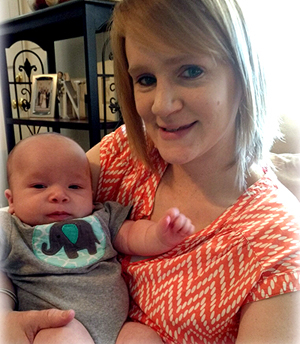
When Molly was pregnant with her third child, she and her husband came in for a routine 18-week scan. They were told that due to an issue with the placenta, it was likely their baby would be born early.
“We figured it would be 36 weeks,” she said. “Never in our wildest dreams did we imagine having our child at just over the halfway mark of my pregnancy.”
Their daughter Kora was born “tiny and perfect” at Duke Hospital, weighing just 1 pound, 6 ounces. She spent 146 days in the Duke Neonatal Intensive Care Unit (NICU) before her parents were finally able to take her home.
Katlyn, another new mom, gave birth to quadruplets at just under 26 weeks. She chose to enroll them in Duke studies exploring new therapies for premature infants. “Two decades ago, babies born at 25 weeks would have had no chance at survival,” Katlyn said. “But because of research, now they have a chance to save these precious little ones.”
Peggy enrolled her premature daughter in every Duke research study she qualified for. “We knew that the care she was receiving was a direct result of past research participation from other families.”
Kimberly, the mother of a baby boy, had firsthand experience of what research can do. As a child she’d been diagnosed with leukemia and given a bone marrow transplant. “If other people had not been willing to participate in research, some of the procedures might not have been available to me. I am more than happy have my son help future babies going through a similar situation.”
The Duke Neonatal-Perinatal Research Unit is full of stories like these—parents who chose, during one of the most frightening and stressful times of their lives, to voluntarily participate in an enterprise larger than themselves and their children, contributing to exploration that could change the lives of people they will never meet.
Premature infants, sometimes called “preemies,” are susceptible to a host of health challenges, and one of the most serious is the prospect of brain injury. If oxygen flow is restricted at any point during pregnancy or birth, or if there is an event such as a stroke, the brain can undergo serious cellular damage.
Conditions like cerebral palsy, a direct result of perinatal brain injury, are rare (about 3 out of every 1000 live births in the US), but carry an average lifetime cost of $1 million per child. On top of that, the emotional, social, and physical effects are incalculable.
“Perinatal brain injury is a lot more common than the layperson probably understands,” says Dr. Eric Benner, a Duke physician and researcher investigating cutting-edge treatments to reverse the effects of brain injuries.
Benner does understand—because he too is one of these parents. His twins were born prematurely at 28 weeks, an event that changed the course of his life. Now he’s pursuing solutions that he hopes will change the course of many lives to come. (Read this story here.)
Discovery relies on the courage of the parents and the babies themselves, who are part of a decades-long story—people like Sharika, a mother who said, “I chose to participate in research because it could be helpful to other preemies and their families now and in the future.”
At the time she spoke, Sharika’s daughter was still in the NICU, having been there for 114 days. “It was rough in the beginning, and I was always sad. But now I feel a lot better. Her dad and I visit her every day…I make sure that I hold her and interact with her as much as I can.
“I love her so much…and I can’t wait for her to come home.”
Join us in the coming weeks for parts 2 and 3 in this series. We'll tell the story of two Duke researchers, Dr. Eric Benner and Dr. Michael Cotten, who are blazing new paths in treating infants with brain injuries. These projects are supported by Duke CTSI Accelerator through their pilot funding programs.